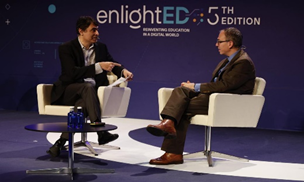

5th December 2022 (8 Topics)
Context
Recently, a conference called ‘enlightED’ took place in Spain focusing on the question of education in the digital age.
About
About the ‘enlightED’:
- ‘enlightED’ is a global conference on education, technology, and innovation that started in 2018.
- This year it was the fifth edition of the summit held in Spain.
- It has the support of the “la Caixa” Foundation, which joins Fundación Telefónica, IE University, and South Summit as organizers of the event.
- The three main themes for 2022 were:
- digital skills of today and tomorrow
- disruptive classrooms; and advancing equity
- inclusion through innovation
Key Points Discussed:
- Need of bringing digitization to underdeveloped communities
- Ending inequalities by empowering younger generations
- Role of social entrepreneurship in promoting inclusion
- Identifying new areas for development within a start-up ecosystem
Digital Education in India:
- Digital literacy is a learning method using technology.
- It aims at helping all students gain knowledge in every corner of the country.
- Digital Education in India is believed to be the future of learning.
- Recognizing the rapid development of digital education, the government has introduced a new National Education Policy (NEP) that emphasizes digitization as well as the use of technology in education.
Present status:
- Recently, the Ministry of Education informed Lok Sabha that less than 10% of schools are equipped with Information and Communication Technology (ICT) tools or Digital Tools, in at least 10 states in India.
ICT Tools: ICT tools for teaching and learning cover everything from digital infrastructures such as printers, computers, laptops, tablets, etc., to software tools such as Google Meet, Google Spreadsheets, etc.
Initiatives by the state government:
- Video wall Chandigarh: Video walls have been set up in 03 Senior Secondary schools. UT Chandigarh has provided all Secondary and Senior Secondary Schools with LCD projectors in ICT labs.
- “Motor iskool”: Chhattisgarh has initiated “Motor iskool” to provide a face-to-face learning program.
- Mobile Learning Van”: Gujarat has got Mobile Learning Van and Utilization Computer Lab Asset Mobile van for reaching its students for active learning.
- “Alumni’s Effort, Kerala”: In Kerala, through a collective social effort by LSGs, Alumni, etc., all students were provided with access to Digital Classes, thereby ensuring an All-Inclusive digital learning model.
- Chat-based assessment, Telangana: The government of Telangana has launched a chat-based assessment and learning solution in the state with the support of ConveGenius and the Central Square Foundation.
|
Digital Gap in Education:
|
Challenges:
- Inadequate Internet Penetration
- Slow Internet Speed
- Lack of Teacher Training
- Lack of Practical Learning for students
- Issue of Parenting
- Lack of Proper Study Rooms at homes
- Social Inequity
Other Important Government Initiatives
- PM eVidya.
- Swayam Prabha TV Channel
- SWAYAM portal
- Digital Infrastructure for Knowledge Sharing (DIKSHA)
- NISHTHA on DIKSHA
- VidyaDaan
- National Educational Alliance for Technology (NEAT 3.0)
- CBSE Podcast- Shiksha Vani
- Digitally Accessible Information System (DAISY)
- Manodarpan


